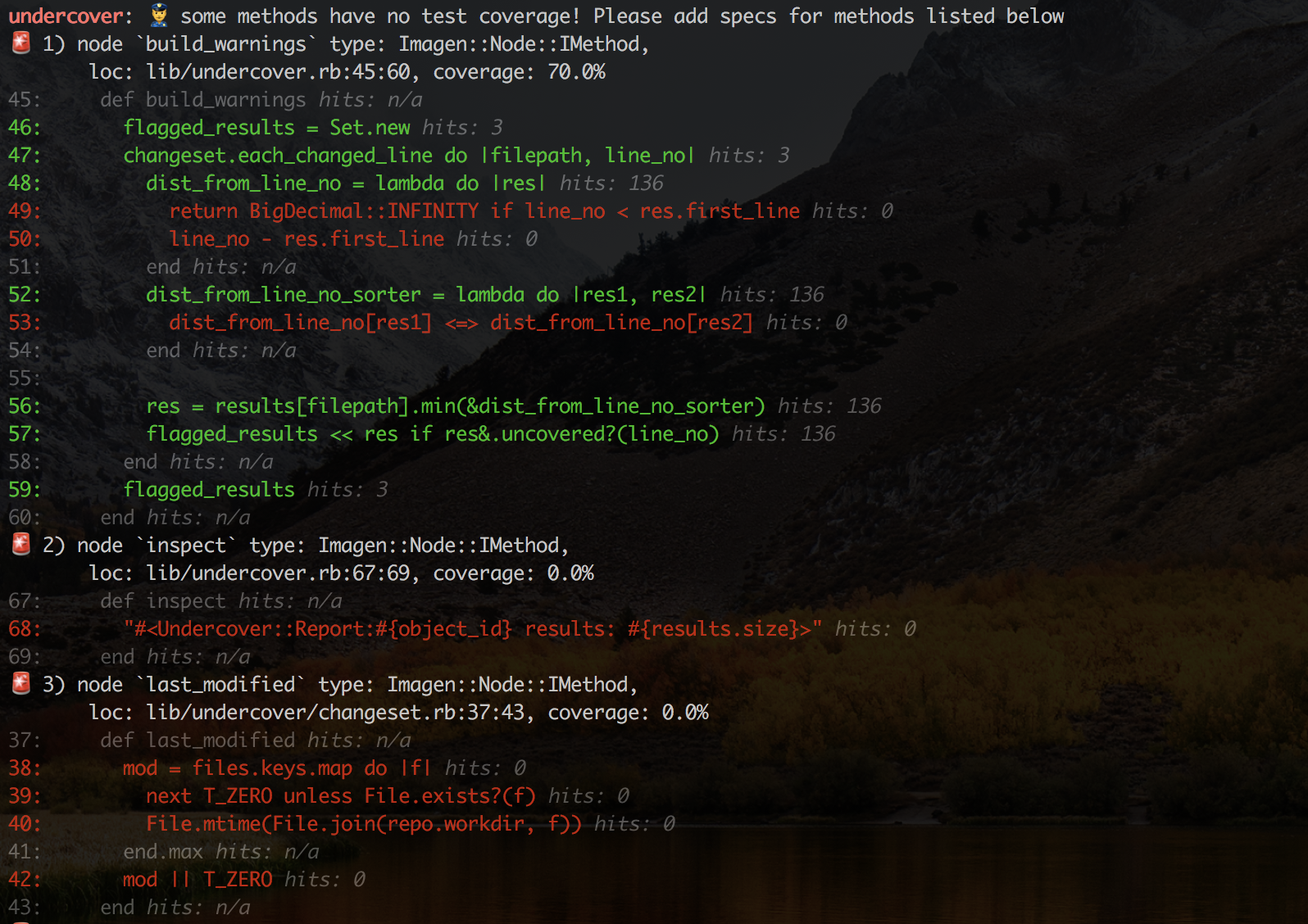Like RuboCop but for code coverage
Inspects files in a git diff and warns on methods, classes and blocks which need test coverage. Use it locally or as part of an automated build to shorten your code coverage feedback loop!
I wanted to create a tool to help others and myself ensure that tests are written for all the recent code changes. This should be useful for any ruby project, but especially those large or legacy codebases that lack testing (and we can't or don't want to invest in full test coverage).
The goal was to provide automated warnings, that are:
- relevant, so scoped to the actual code changes
- timely, so we don't end up writing tests long after the implementation
- actionable, so we can fix them before the code is committed or reaches production
For more background, please read the blog post.
Technically, undercover combines data from git, coverage reports and code structure graphs.
A sample output of undercover ran before a commit may look like this:
And like this, given that specs were added:
The project is in an early phase, so please expect the unexpected and report any problems or feedback as issues.
Add this line to your application's Gemfile:
gem 'undercover'And then execute:
$ bundle
Or install it yourself as:
$ gem install undercover
To make your specs or tests compatible with undercover by providing an LCOV report, please add simplecov and simplecov-lcov to your test setup.
# Gemfile
group :test do
gem 'simplecov'
gem 'simplecov-lcov'
end
# the very top of spec_helper.rb
require 'simplecov'
require 'simplecov-lcov'
SimpleCov::Formatter::LcovFormatter.config.report_with_single_file = true
SimpleCov.formatter = SimpleCov::Formatter::LcovFormatter
SimpleCov.start do
add_filter(/^\/spec\//) # For RSpec
add_filter(/^\/test\//) # For Minitest
end
require 'undercover'
# ...Then run your test suite once through to generate the initial coverage/lcov/*.lcov file before you can run the undercover command
undercoverUndercover will list all methods and classes that haven't been covered in specs and have been added since a given git ref. Use the -c --compare ref flag to specify a git ref (commit hash, branch name, tag) to compare against.
This is a recommended usage for CI/CD build environments, as undercover will exit 1 if there are any warnings.
undercover --compare masterundercover -h
Usage: undercover [options]
-l, --lcov path LCOV report file path
-p, --path path Project directory
-g, --git-dir dir Override `.git` with a custom directory
-c, --compare ref Generate coverage warnings for all changes after `ref`
-h, --help Prints this help
--version Show versionThe defaults assume that the program is run from the top level of the project directory.
After checking out the repo, run bundle to install dependencies. Then, run rake to run the tests and RuboCop. You can also run pry -r 'undercover' for an interactive prompt that will allow you to experiment.
To install this gem onto your local machine, run bundle exec rake install. To release a new version, update the version number in version.rb, and then run bundle exec rake release, which will create a git tag for the version, push git commits and tags, and push the .gem file to rubygems.org.
Bug reports and pull requests are welcome on GitHub at https://github.com/grodowski/undercover.
The gem is available as open source under the terms of the MIT License.

